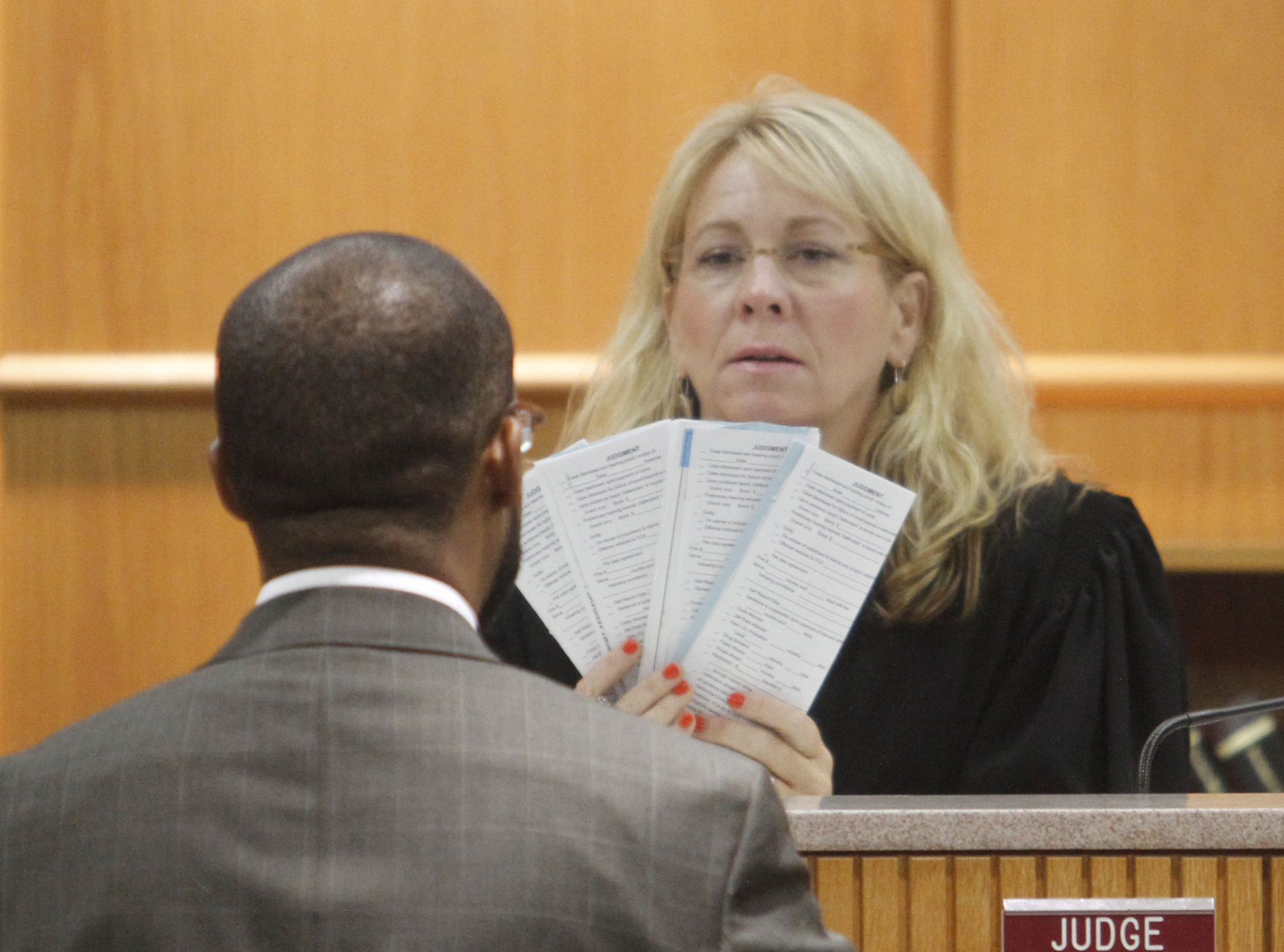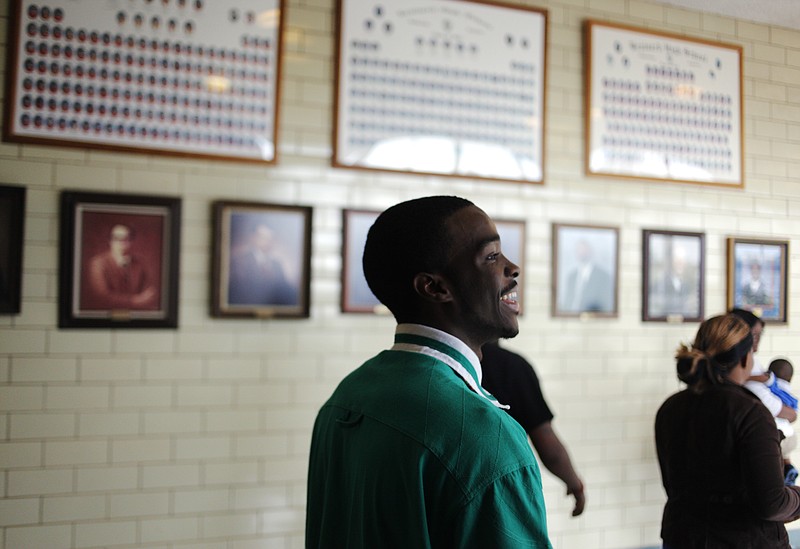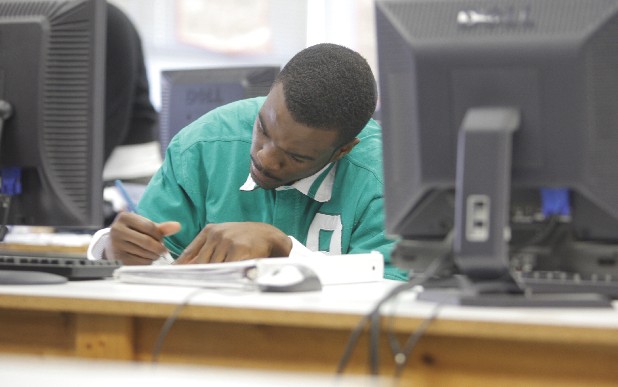On Christmas Day 2011, Jumoke Johnson Jr. sat on a bench in the Police Services Center waiting for investigators to question him about a shooting hours earlier that wounded nine people at a downtown club.
His name came up after the mass shooting, as it often did following violence. Again and again, witnesses said Jumoke was the man behind the trigger. But police could never prove it.
He was a charismatic teenager, both book smart and street smart, cool under pressure. At 18, he'd already become a gang leader, relying on his natural ability to sway others to do his bidding.
So Jumoke sat on a bench on Christmas Day, and beside him sat police officer Josh May.
They talked as they waited, about everything. Girls, the future, what they'd be doing if they weren't at the police station. Jumoke wasn't handcuffed. He was calm, polite, engaged, listening, asking questions.
"Sitting down with this infamous kid, who was allegedly involved in everything, and just sitting there talking to him, it was like I was hanging out with a fraternity brother," May said. "You look at the eyes of some of the guys involved in this stuff and you see their souls are damaged, there is almost no hope, you see it's a lost cause trying to explain anything to them. This guy was the antithesis to that."
Jumoke didn't know it then, sitting on that bench, but five months later, he'd become the first in his family to graduate from high school - then be handed a full scholarship to attend college.
His life, weighted by generations of crime and poverty, hung at a turning point - the streets, on one side, with money and danger, and college on the other, offering a new way of life.
"These streets call so many people back," May said. "And they eat up so many people."
 Judge Christie Sell fans out the assorted previous charges against Jumoke Johnson in front of attorney Gerald Webb on Friday, May 4, 2012. Johnson was taken into custody Friday morning during a hearing before Judge Sell after she doubled his bond in sessions court. Webb was Johnson's representation during early hearings. The hearing was regarding a charge of aggravated assault that stemmed from a jail house fight the last time Johnson was incarcerated.
Judge Christie Sell fans out the assorted previous charges against Jumoke Johnson in front of attorney Gerald Webb on Friday, May 4, 2012. Johnson was taken into custody Friday morning during a hearing before Judge Sell after she doubled his bond in sessions court. Webb was Johnson's representation during early hearings. The hearing was regarding a charge of aggravated assault that stemmed from a jail house fight the last time Johnson was incarcerated.***
One night in East Chattanooga more than a decade ago, police officers untangled an 11-year-old boy and his bicycle from the underside of a car.
The boy under the car was wide-eyed, scared, staring up at those officers.
Somehow, Jumoke escaped the crash unscathed, and before long, he was back roaming the neighborhood, Capt. Glenn Scruggs said.
Even then, police in the Avondale and Eastdale neighborhoods knew Jumoke. He was that kid who was always around, always in the middle of something, always out on his own, unsupervised. He matured in neighborhoods plagued by violence, poverty and drugs.
His grandfather served time in federal prison and his father, Jumoke Johnson Sr., was locked up, too. Once a successful drug dealer, his father's name carried weight on the streets. Police often found Jumoke hanging out with older guys.
"Whereas the big guys on the block might have run some other kid off and not let him hang around, for him, it was, 'Hey it's li'l Jumoke,'" Scruggs said. "And so because he got that attention, he matured on the street a lot faster than other kids on the street did."
Perhaps that's one of the reasons Jumoke became such a strong leader.
At Brainerd High School, teachers told how Jumoke could quiet a classroom in a moment, but also how he always seemed to be nearby when students fought, how the fighters would look to him for guidance on how to behave. His principals bragged about his intelligence.
"He had power over people," May said. "He could stop as many fights as he could start."
Officers had a softball team going then, and they'd practice on a field in Avondale. Sometimes Jumoke would show up and play outfield.
His name came up again and again as police investigated shootings and homicides. He gained a sort of mythical status, a legend on the streets, and investigators had to wade into the rumors to try to find the truth.
"He knew he was a high-profile guy, and he enjoyed being that guy," Scruggs said. "He'd go places he knew put him in harm's way just to get a reaction from opposing guys."
Jumoke always denied the allegations, and police couldn't prove them. He was never charged in connection with the Christmas Eve shooting.
In 2012, after the Times Free Press published a story about Jumoke, an anonymous donor offered to pay for four years of education at Miles College in Fairfield, Ala.
A judge made attending a condition of Jumoke's probation - at the time, he faced a domestic violence charge, as well as assault. Everyone urged him to get out of Chattanooga. And stay out.
His attorney at the time, Gerald Webb, remembers talking about the future with Jumoke.
"When your name becomes hot in the street, when the police are talking about you, when the streets are talking about you, sometimes the only thing you can do is leave," he said. "You have to get out of here."
Jumoke went to college. But he got kicked out during his first semester.
And he came back to Chattanooga.
***
On April 1, 2013, Jumoke was visiting a friend on Rawlings Street when a neighbor's house caught fire.
A woman returning from the store screamed when she saw the flames. Her children were inside.
Jumoke raced to the home and tried to break through the back door to get to the kids. But the metal security door was locked tight. Bars blocked the way in.
Jumoke kept trying, neighbors said, fighting to get to the kids.
The smoke and heat intensified as police arrived, and they couldn't get inside either. An SUV parked yards from the house melted. One child died in the blaze, the other at a hospital.
"That was one of the days that he was genuinely trying to help out," said Scruggs, who was there that day. "But [those days] were not as many as the days that he wasn't trying to help out."
Seven months after the fire, in November 2013, Jumoke was arrested as part of a cocaine dealing sting that snared more than 30 men who authorities called drug dealers, the "worst of the worst."
In 2015, he pleaded guilty to one count of conspiracy to distribute more than 28 grams of cocaine. He was sentenced to 65 months in federal prison - just over five years - with four years of supervised release.
"He was a young man who had an option, who had a chance and could have done something different, and for whatever reason didn't take that path," Webb said. "I think sometimes people feel like they walk so far down a path they can't turn around and walk another path. They just have to walk it until the conclusion."
***
At some point while serving his federal sentence, Jumoke was transferred to a halfway house on McCallie Avenue in Chattanooga.
It's not clear exactly when that happened, or why - neither the U.S. Probation and Parole Office or the Federal Bureau of Prisons responded to requests for comment last week.
At the halfway house, Jumoke was working a job, May said. He believes Jumoke was set to be released in a few months, and that the now 23-year-old was planning to move to Nashville to start fresh.
But in early January, Jumoke cut his ankle bracelet and walked away from the halfway house.
"He made a conscious decision to take the road he traveled," Scruggs said. "And unlike a lot of kids, he had a great opportunity to go another direction, and he chose not to."
It happens often, said Jay Franklin, a consultant with the National Gang Center in the U.S. Department of Justice.
"The lifestyle is addictive," he said. "And guys that sell drugs, it's the same as a drug user, they get addicted to the violence, to the lifestyle and to the instant financial gratification. We don't understand that strong hold of the gang culture."
Jumoke was free for a few days.
Then on Jan. 20, one car chased another down East 12th Street, bullets flying between them.
The front car crashed, piling on top of another vehicle.
Two young men in that car died, wounded by bullets and the crash.
Christopher Woodard, 20.
And Jumoke.


